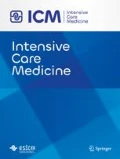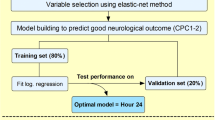Abstract
Of 347 victims of out-of-hospital cardiac arrest 196 (56.5%) died before and 109 (31.4%) after admission to hospital, while 42 patients (12.1%) were discharged alive. The 37 patients (10.7%) discharged without severe hypoxic brain damage were assigned to the group with “good”, the remaining 310 patients to the group with “poor outcome”. From results of stepwise logistic regression, a score was derived to specifically identify victims with poor prognosis (values in brackets=score points; cutpoint: score>3 points): age≤70 (0), 71–80 (1), >80 (2); ECG ventricular fibrillation (0), other (1); no aspiration (0), aspiration (1); pupils round (0), not round (1); gasping (0), apnea (1); bystander resuscitation — yes (0), no (1). Evaluation of the score revealed a specificity of 100% (0.95 confidence interval: 80%–100%) and predictive value of 100% (0.95 confidence interval: 95%–100%). A predictive score for specific identification of victims with poor prognosis can contribute to decision making in out-of-hospital cardiac arrest.
Similar content being viewed by others
References
Standards and guidelines for cardiopulmonary resuscitation (CPR) and emergency cardiac care (ECC) (1986). JAMA 255:2905–2984
Eisenberg MS, Hallstrom A, Bergmer L (1981) The ACLS score. JAMA 246:50–52
Roth R, Stewart RD, Rogers K, Cannon GM (1984) Out-of-hospital cardiac arrest: factors associated with survival. Ann Emerg Med 13:237–243
Ritter G, Wolfe RA, Goldstein S, Landis JR, Vasu CM, Acheson A, Leighton R, VanderBrug Medengrop S (1985) The effect of by-stander CPR on survival of out-of-hospital cardiac arrest victims. Am Heart J 110:932–937
Bertini G, Margheri M, DeSimone L, Giglioli C, Masini M, Poli C, (1985) Morte improvisa cardiaca. Sperimentazione di un sistema extra ospedaliero di emergenza. G Ital Cardiol 15:1128–1138
Urban P, Cereda JM, Righetti A (1985) Mort subite extrahospitalière: évaluation de l'activité de l'unité mobile de soins intensifs de Genève. Schweiz Med Wochenschr 115:206–209
Aprahamian C, Thompson BM, Gruchow HW, Mateer JR, Tucker JF, Stueven HA, Darin JC (1986) Decision making in prehospital sudden cardiac arrest. Ann Emerg Med 15:445–449
Litwin PE, Eisenberg MS, Hallstrom P, Cummins RO (1987) The location of collapse and its effect on survival from cardiac arrest. Ann Emerg Med 16:787–791
Jacobson J, Nyquist O, Rehnqvist N, Nordlander R, Astrom H, Vallin H, Liljefors I (1987) Prognosis and clinical follow-up of patients resuscitated from out-of-hospital cardiac arrest. Acta Med Scand 222:123–132
Lazlo Engelman (1985) Stepwise logistic regression. In: BMDP statistical software manual. University of California Press, Berkely, USA, pp 330–344
Mullie A, Lewi P, van Hoyweghen R, the Cerebral Resuscitation Study Group (1989) Pre-CPR conditions and the final outcome of CPR. Resuscitation 17 [Suppl]:11–21
Weaver WD, Copass MK, Bufi D, Ray R, Hallstrom AP, Cobb LA (1984) Improved neurologic recovery and survival after early defibrillation. Circulation 69:943–948
Weaver WD, Cobb LA, Hallstrom AP, Fahrenbruch C, Copass MK, Ray R (1986) Factors influencing survival after out-of-hospital cardiac arrest. J Am Coll Cardiol 7:752–757
Cummins RO, Eisenberg MS, Hallstrom AP, Litwin PE (1985) Survival of out-of-hospital cardiac arrest with early initiation of cardiopulmonary resuscitation. Am J Emerg Med 3:114–118
Myerburg RJ, Kessler KM, Zamann L, Conde CA, Castellanos A (1982) Survivors of prehospital cardiac arrest. JAMA 247:1485–1490
van Hoyweghen R, Mullie A, Bossaert L, The Cerebral Resuscitation Study Group (1989) Decision making to cease or continue cardiopulmonary resuscitation (CPR). Resuscitation 17 [Suppl]:137–147
Eisenberg MS, Copass MK, Hallstrom AP, Blake B, Bergner L, Short EA, Cobb LA (1980) Treatment of out-of-hospital cardiac arrests with rapid defibrillation by emergency medical technicians. N Engl J Med 302:1379–1383
Kleinbaum DG, Kupper DL, Morgenstern H (1982) Epidemiological research — principles and quantitative methods. Lifetime Learning Publications, Belmont, USA
Grayzel J (1989) A statistic for inferences based upon negative results. Anesthesiology 71:320–321
Author information
Authors and Affiliations
Rights and permissions
About this article
Cite this article
Kentsch, M., Stendel, M., Berkel, H. et al. Early prediction of prognosis in out-of-hospital cardiac arrest. Intensive Care Med 16, 378–383 (1990). https://doi.org/10.1007/BF01735175
Received:
Accepted:
Issue Date:
DOI: https://doi.org/10.1007/BF01735175




